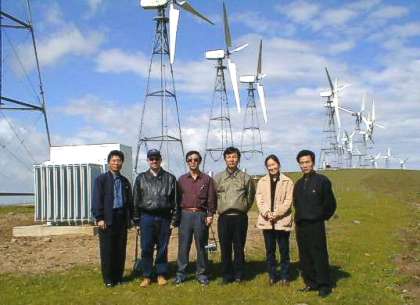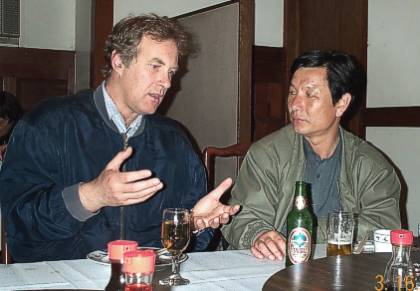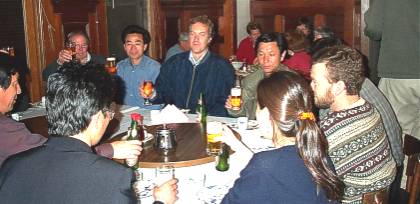Third Delegation of Energy Specialists from Democratic People’s Republic of Korea Concludes Visit to U.S.
BERKELEY, CA, MARCH 17, 2001 — A five-person delegation of North Korean engineers today completed a three-week visit to the United States to study renewable energy issues at the invitation of the Berkeley-based Nautilus Institute for Security & Sustainable Development.
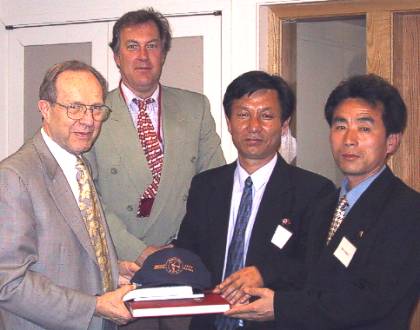
Dr. Peter Hayes and DPRK delegation members present a hat and books to Dr. William Perry (L), Stanford.
“Exchanges like this are essential to promoting peace and sustainable development on the Korean Peninsula,” said Nautilus Executive Director Peter Hayes. “At a time when U.S.-DPRK rapprochement is coming under fire in many circles, this kind of visit demonstrates that Americans and North Koreans can collaborate on technical exchanges to solve humanitarian problems.”
The visit was the third such training mission to the U.S. hosted by Nautilus. Previous energy delegations visited April-May of 1999 and December of 1997. Nautilus has sent three delegations of American engineers to the DPRK in May and October of 1998, and September of 2000, to install seven wind turbines and a water-lifting windmill.
The delegation consisted of three engineers and a translator from the Nonconventional Energy Development Center in Pyongyang, along with Kim Il Bong, Secretary-General of the Korean Anti-Nuke Peace Committee, which has been working with Nautilus on the cooperative development of renewable energy in the DPRK.
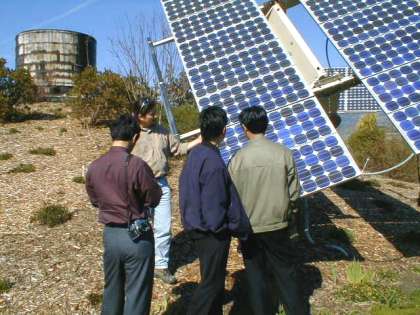
Jason Miller of the Institute for Solar Living explains the latest photovoltaic (solar electric) technology.
The delegates, who arrived on February 23, participated in a multilateral meeting of the East Asian Energy Futures (EAEF) project, along with experts from South Korea, Japan, Russia, China, and the United States.
“It was interesting to watch the North and South Koreans interact,” said Timothy Savage, Program Officer for Northeast Asia in the Nautilus Institute’s Program on Global Peace & Security. “Many of them had met at the previous EAEF meeting in Beijing last June, and they were quite friendly and relaxed in each other’s presence.”
Following the meeting, EAEF participants took part in a five-day training on the use of the Long-range Energy Alternatives Planning (LEAP) System conducted by Nautilus Senior Associate David Von Hippel.
During the remaining two weeks of their stay, the DPRK engineers participated in a series of workshops and trainings. The delegates were taught the basics of email and web use, and spent several hours searching the worldwide web for information on renewable technology. They discussed the installation and use of an ultraviolet water purification unit transferred by Nautilus during last September’s mission with water sanitation expert David Greene. Dr. Ramesh Bhatia of the University of California, Davis taught the delegates about the use of biogas technologies in India and China, and discussed its applicability to the North Korean context. Kirk Smith, Professor of Environmental Health Sciences at the University of California, Berkeley (UCB), and Chairman of the Nautilus Board of Directors, discussed household environmental pollution with the delegates. They also received presentations on fuel cells, biomass, solar, and wind power from scientists at the Renewable & Appropriate Energy Laboratory at UCB, led by Professor Dan Kammen.
Field trips included visits to the Institute for Solar Living; the Power Works windmill site at Altamont Pass; the Tracy Biomass Plant, and Xantrex in Livermore.
The delegation also traveled down to Stanford University to meet with members of the Center for International Security and Cooperation (CISAC), including Dr. William Perry, former U.S. Secretary of Defense and DPRK Policy Coordinator under former U.S. President Bill Clinton. Nautilus personnel and North Korean delegates jointly presented their project to the CISAC members present.
The delegation also visited the Ploughshares Fund, a major donor for international security issues, and met with founder and President Sally Lilienthal and Executive Director Naila Bolus.
During their stay, the DPRK delegation had ongoing discussions with Nautilus staff about the future of their joint collaboration, and reached some tentative agreements on next steps.
The next Nautilus mission to the DPRK is scheduled for September, 2001.


